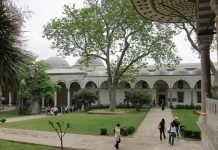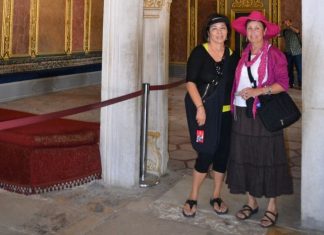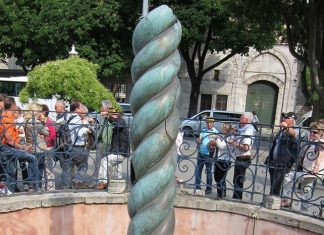The third and last daughter was very tall, curt and glib of tongue, but not so beautiful as her sister. Their uncle, the emperor Basil, died without making any plan for their subsequent promotion, and as for their father, even he, when he acceded to the throne, failed to reach any wise decision about their future, except in the case of the second sister, the one who was most like an empress. I will tell the story of that decision, and of the plan he made on his death-bed, as my narrative proceeds.
Actually, this princess and the third sister acquiesced in the ideas of their uncle and father, and made no plans of their own, but the eldest, Eudocia (for that was her name), whether because she had no desire for power, or because she had her affections fixed on higher things, begged her father to dedicate her to the service of God. He readily agreed, and she was presented to the Lord as an offering, the first-fruits, so to speak, of her parents’ marriage. Constantine’s intentions for the other two were kept a dark secret. However, I must not speak of that yet.
I would like now to sketch the emperor’s character, without bias either one way or the other. When the whole government came to depend on himself, he was by no means the man to expend his own energies on cares of state. Putting the wiser of his subjects in charge of affairs, he merely gave audiences to embassies, or administered some other easy matter, seated most royally on his throne. However, when he did have occasion to make a speech, he astonished all hearers by his logical arguments.
As a matter of fact, he had not much learning. He had acquired a smattering of culture, just as much as one considers enough for children, but he was possessed of great natural intelligence and more than ordinary grace. He had the added advantage of a tongue both melodious and refined: arguments conceived in his mind were, so to speak, brilliantly delivered by his tongue.
Personally dictate some of the imperial rescripts
He did, indeed, personally dictate some of the imperial rescripts (he made that a point of honour) and the quickest writers could not keep up with him, he spoke so fast, and that despite the fact that he was fortunate in the number and quality of his secretaries, writers so fast that few generations have seen their like. Overwhelmed by the speed of his words, they used to interpret most of his thoughts and expressions by special symbols of their own.
He was a man of enormous size, standing up to nine feet in height. His constitution, moreover, was more than usually robust, and his digestive powers were extraordinary, with a stomach naturally adapted to assimilate all kinds of food with ease.
Read More about Byzantium in the Eleventh Century








